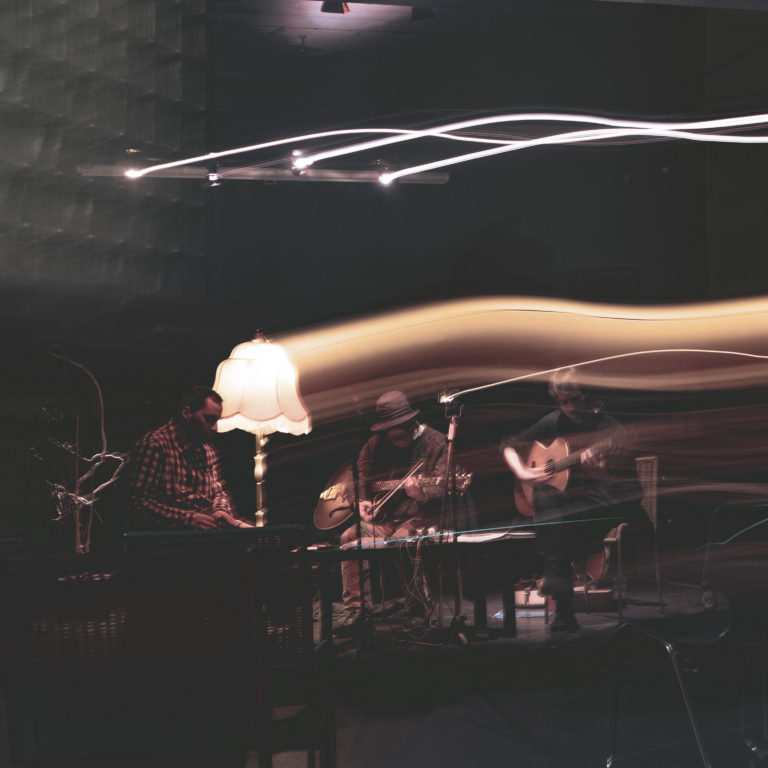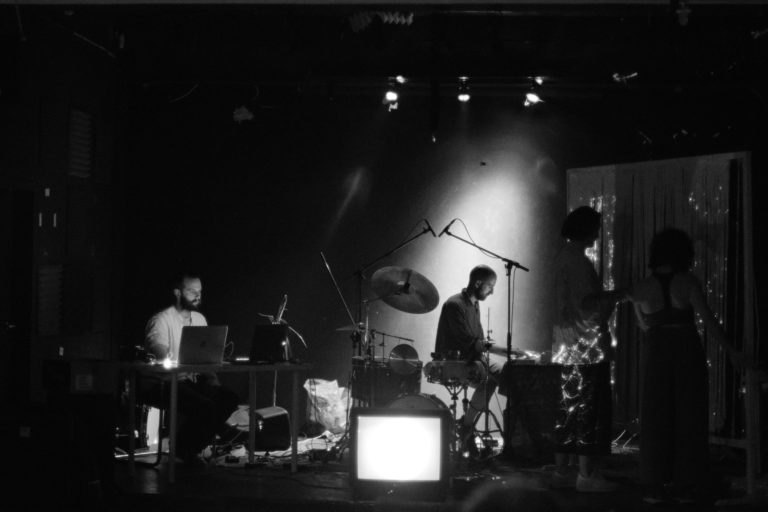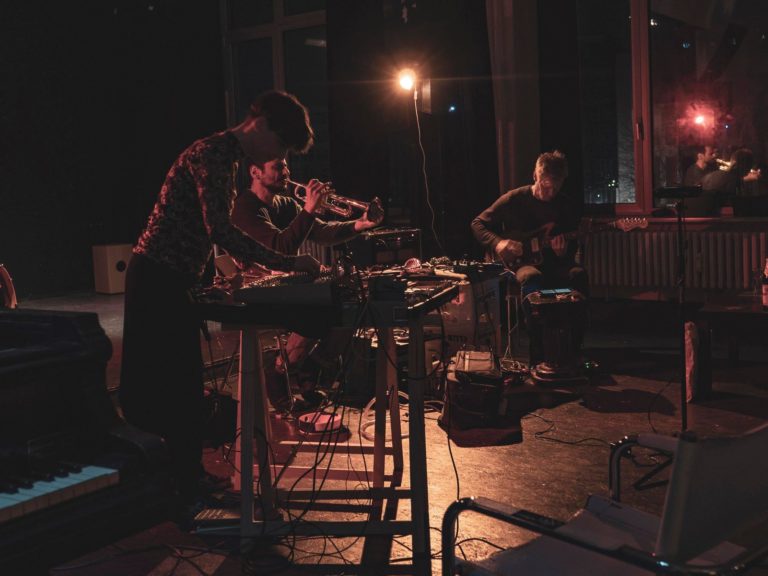How PAS Provides Housing and Space for Artists to Grow in Berlin
This article is part of Reset! Yearly Focus 2025: Reclaiming Spaces
Author: Jamie Noone
PAS uniquely offers the opportunity for artists to come and live, helping cultivate a collective space and allowing freedom to express one’s art through an unorthodox living arrangement—reclaiming both mental and physical space.

© Joey Gavin
Petersburg Art Space, more commonly known as PAS, according to themselves, ‘is an art space and event venue, open to all branches of art and science’. This is certainly true when you look at the wide variety of PAS performances, from experimental free jazz to intimate folk gigs. PAS fosters a sense of creative wanderlust in the German capital.
With the decreasing availability of housing in Berlin, PAS offers a refuge for artists looking for space to work on their craft, avoiding working orthodox jobs to pay for the practice of their art.
Gentrification is affecting music and art scenes across Europe, and spaces like PAS can show us how artists' living spaces and working quarters can be incorporated to aid the local scene, reducing cumbersome overheads that often make it harder for artists to invest in their creativity fully.
PAS is run by its residents and largely funded through its shows, exhibitions, and workshops. The running of such a venue requires keen collaboration between its residents. Most, if not all, occupy jobs such as bartending, controlling the light and sound for its concerts, cleaning, bookkeeping… the list goes on. It is this, amongst other things, that make PAS distinct from traditional venues and art spaces.
I sat down with one of PAS's chairpeople and ex-resident, Joey Gavin, who has been heavily involved in almost every corner of the event’s operations for the past five years. I wanted to understand Joey's vision for PAS and to discuss the difficulties the team experiences amid the current cost-of-living crisis facing Germany and, indeed, the world over. I also wanted to understand what makes PAS unique, where it is currently, and what plans they have for the future.

© Joey Gavin
Battling the Cost of Living
Most Berliners are acutely aware of the rise in rent in the city. According to the German Economic Institute (Institut der Deutschen Wirtschaft), the national rent increase in the last quarter of 2024 was 4.7%; in Berlin, however, it rose by 8.5%. Approximately 260,000 apartments were built in 2024, with the number expected to drop to roughly 230,000 in 2025. Many people fear the dreaded search for an apartment—scouring the plethora of apps, websites, forums, and Instagram stories, only to be beaten by someone who applied five seconds before you. Not for the faint-hearted. With that being said, artists need space and financial freedom to work on their craft, and PAS offers exactly that: physical and mental space.
Joey shares his initial thoughts on PAS as an artist and a booker.
“As I came to know it (PAS), it is pretty DIY, and it grew substantially because of the community and the energy that was going into it. Yeah, and for that to happen, it had to allow for time and space for the individuals to kind of breathe…It is quite a nice nest, like there was no pressure.”
Artists need freedom for refining, creating, or just ideating, and places such as PAS reconcile the idea that there must be a shift toward allowing people basics, such as feasible rent and affordable daily expenses.
The unorthodoxy of this organisation attracts a certain ilk of people, clearly dedicated to their art—Joey speaks about how one manages to foster the sense of community.
“A lot of people came through, and some of the people were highly motivated and highly intelligent, and that was very nice. I was trying to curate the atmosphere of the vibes because I had the seniority, so I was like the buffer between the people and the space, and we fostered a nice community atmosphere…but also the people who showed the most initiative got more involved with the organisation and decision making.”
“People were there that had time and space, and importantly love for the space to devote their time and energy into improving it, and there’s always an ongoing thing where there are repairs needed, but we have a structure, and we could allocate the different roles that were needed.”
The conversation then shifted toward how PAS was managing and affected by the current cost of living crisis, as well as the solutions they must turn to.
“We’re feeling the pinch too with the rising rents, as we are self-funded, we have to be kind of dynamic in what we do, we’re looking at some crowdfunding options, archival access initiatives, and running independent workshops”
As previously mentioned, the venue is funded through the rent from its residents, along with the plethora of shows on offer, alongside privately renting a section of the property to tourists.
“There are people on the verge of bankruptcy and mental burnout, it can be exhausting to keep it up, but it is certainly the longest thing I have been a part of, and you still have really motivated people that come through, especially some younger people who would be more tech savvy in that way. So, like with that, I think we are working mainly on streamlining everything and making it a little bit more efficient.”
PAS seems to be operating on the adage of ‘building the plane while trying to fly it’ attitude, in that it imbues the classic DIY approach that is found across the music and art scene in Berlin. Amid the gentrification and commercialisation of event spaces across Europe and Berlin too, this is now more than ever a formidable characteristic and still attracts artists across the globe to come and experiment freely, and one that must be nurtured.

© Joey Gavin
What’s on the Agenda for PAS?
The range of artists that perform in PAS has always been a unique ‘selling point’ for PAS. On a Tuesday night, you could walk up the stairs and hear the complex melodies of an experimental jazz ensemble or be greeted by the thudding strums of a local songwriter or walk into a Becketian play.
Joey then explains what gigs were lined up and the vision of PAS as it plays out on the stage.
“We have this monthly showcase called ‘Hard to Talk’, it is the most fun night, it’s like a variety show, and it's always a bit of chaos, you know. It’s my favourite night, a night once a month where residents can perform, it’s got experimental music, which is kind of our bread and butter, but we would have a few singer-songwriters performing it too”
Concluding Thoughts
Berlin is a city in flux at the moment, at a time when its values are being challenged and its spaces and venues are becoming increasingly under attack, rising rents and licences mean that venues can no longer operate sustainably and must shut their doors.
PAS offers the unique space of home and venue, artists have thrived in this environment due to the vibe that is on offer, but talking to Joey, you quickly understand that above all else, it survives on the work of its residents and the love, energy, and time that they put into it.
This is a lesson that can be replicated when considering other venues and spaces, and the need that we must not take them for granted, we must put time and effort into keeping the spaces alive and push back against the ever-shrinking nature of our artistic spaces.
You can find a list of upcoming performances happening in PAS throughout the year and next on their website.
Published on September 25th, 2025
About the author:
Jamie Noone is a freelance writer from Dublin, Ireland, based in Berlin, Germany. Specifically writing about underground music scenes across Europe and beyond.